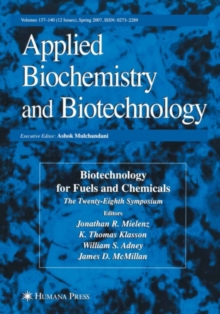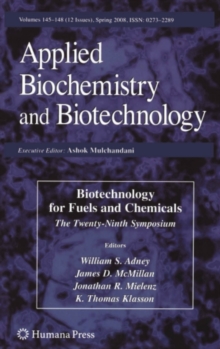
Proceedings of the Twenty-Fifth Symposium on Biotechnology for Fuels and Chemicals Held May 4-7, 2003, in Breckenridge, CO Paperback / softback
Edited by Mark Finkelstein, Brian H. Davison
Part of the ABAB Symposium series
Paperback / softback
Description
th With the 25 Symposium, we continued the tradition of providing an informal, congenial atmosphere that our participants found conducive to discussing technical program topics.
This year's topics included: Session lA Feedstock Supply, Logistics, Processing, and Composition Session IB Enzyme Catalysis and Engineering Session 2 Microbial Catalysis and Engineering Session 3 Bioprocessing including Separations Session 4 Biotechnology for Fuels and Chemicals-Past, Present, and Future Session 5 Biobased Industrial Chemicals Session 6A Biomass Pretreatment and Hydrolysis Session 6B Plant Biotechnology and Feedstock Genomics Special Topics A Microbial Pentose Metabolism Special Topics B International Bioenergy Agency Bioethanol Meeting A summary of these sessions is included at the beginning of each section of the Proceedings.
The technical core of the Symposium remains the creation, manipulation, and practical use of new biocatalysts to pro- duce useful fuels and chemicals.
This was shown in both fundamental science discoveries as well as progress reports from commercialization efforts. However, we have continued to expand interest into the bio- feedstock (plant genomics, production, and pretreatment).
While the pro- duction of sugars from biomass and their subsequent bioconversion into chemicals remains the dominant thrust, areas such as gasification and direct production in plants were presented.
The use of molecular biology and genomics to provide new biocatalysts as well as understanding the fundamentals of the microbes, enzymes, and biomass has increased the likely achievement of both near and long-term commercialization goals.
This year Dr. J.
Information
-
Item not Available
- Format:Paperback / softback
- Pages:1223 pages, XXXVIII, 1223 p. In 2 volumes, not available separately.
- Publisher:Humana Press Inc.
- Publication Date:17/01/2013
- Category:
- ISBN:9781468498738
Information
-
Item not Available
- Format:Paperback / softback
- Pages:1223 pages, XXXVIII, 1223 p. In 2 volumes, not available separately.
- Publisher:Humana Press Inc.
- Publication Date:17/01/2013
- Category:
- ISBN:9781468498738










